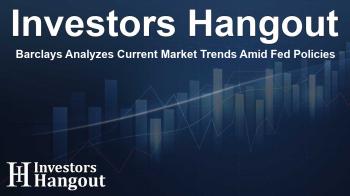Barclays Analyzes Current Market Trends Amid Fed Policies

Understanding the Recent Market Dynamics
The Federal Reserve's recent decisions have prompted a necessary adjustment in the investment landscape. Barclays strategists have shared their views, indicating that the Fed's hawkish approach has cast a spotlight on overenthusiastic market behavior, particularly following the recent economic climate.
Watchful Investors in Uncertain Times
According to experts led by Emmanuel Cau, pockets of excitement within the U.S. equity market are beginning to show signs of concern. A recent survey by the Conference Board revealed that consumer expectations for rising stock prices have reached their highest levels since 1987. This surge in optimism aligns with soaring valuations in sectors like technology and growth, overshadowing broader market trends.
Declining Market Breadth
Barclays has observed a concerning trend: the market breadth is deteriorating, as evidenced by a growing number of daily decliners compared to advancers. Despite a substantial retail surge and systematic buying behavior, institutional investors are showing signs of caution. Some have even begun to lower their market exposures, suggesting that anxiety lies beneath the surface of retail exuberance.
Fed Policy as a Market Force
This backdrop put forth by the Fed's recent meetings indicates possible market pullbacks that strategists had anticipated. Changes in Fed policy are reminding investors that inflationary strategies might inhibit potential rate cuts in the future. With the U.S. 10-year bond yields now around 4.5%, concerns have risen over their negative influence on equity market directions and momentum.
The Impact of Economic Policies
The Fed's stance, which suggests a continued tightening of monetary policy, could introduce volatility in 2025. Barclays strategists caution that how quickly and effectively these economic strategies unfold will greatly influence growth and inflation dynamics as well as overall market stability.
Political Uncertainty and Market Reactions
It's important to note that uncertainty is not solely derived from the Federal Reserve. The impending debt ceiling discussions point toward a brewing political landscape that could exacerbate market volatility and unpredictability in the coming years, even prior to the inauguration of the new administration. Such factors are expected to reshape market strategies going forward, potentially favoring investments in European equities.
A Shift in Global Market Performance
Since the recent U.S. elections, European stocks have notably underperformed against their U.S. counterparts, resulting in a significant disparity in performance. As investors recalibrate in response to the Federal Reserve's policies, the likelihood of this divergence narrowing increases. The dynamics within European markets may offer a more stable investment environment given their less crowded positioning and current valuations.
Looking Ahead: Strategic Perspectives
Investors looking ahead should consider these evolving narratives as they shape their strategies. The interplay between U.S. fiscal policies and global market responses will be critical in understanding future equity performances. With valuations stabilizing in Europe compared to the rather stretched conditions in the U.S., opportunities may arise for discerning investors.
Frequently Asked Questions
What did Barclays say about the Fed's recent actions?
Barclays indicated that the Fed's hawkish stance serves as a reality check, impacting market behavior and investor sentiment.
How are equities performing in response to Fed policies?
There's a mixture of retail enthusiasm and institutional caution, with some investors reducing their exposure to the market.
What does the future hold for market volatility?
Barclays predicts increased volatility influenced by Fed policies and potential political uncertainty affecting economic outlooks.
How have European equities fared compared to U.S. markets?
European stocks have underperformed relative to U.S. markets, but their valuations may present new investment opportunities.
What implications could the debt ceiling debate have on markets?
The early debt ceiling discussions could introduce further policy volatility, impacting market stability over the next few years.
About Investors Hangout
Investors Hangout is a leading online stock forum for financial discussion and learning, offering a wide range of free tools and resources. It draws in traders of all levels, who exchange market knowledge, investigate trading tactics, and keep an eye on industry developments in real time. Featuring financial articles, stock message boards, quotes, charts, company profiles, and live news updates. Through cooperative learning and a wealth of informational resources, it helps users from novices creating their first portfolios to experts honing their techniques. Join Investors Hangout today: https://investorshangout.com/
Disclaimer: The content of this article is solely for general informational purposes only; it does not represent legal, financial, or investment advice. Investors Hangout does not offer financial advice; the author is not a licensed financial advisor. Consult a qualified advisor before making any financial or investment decisions based on this article. The author's interpretation of publicly available data shapes the opinions presented here; as a result, they should not be taken as advice to purchase, sell, or hold any securities mentioned or any other investments. The author does not guarantee the accuracy, completeness, or timeliness of any material, providing it "as is." Information and market conditions may change; past performance is not indicative of future outcomes. If any of the material offered here is inaccurate, please contact us for corrections.
